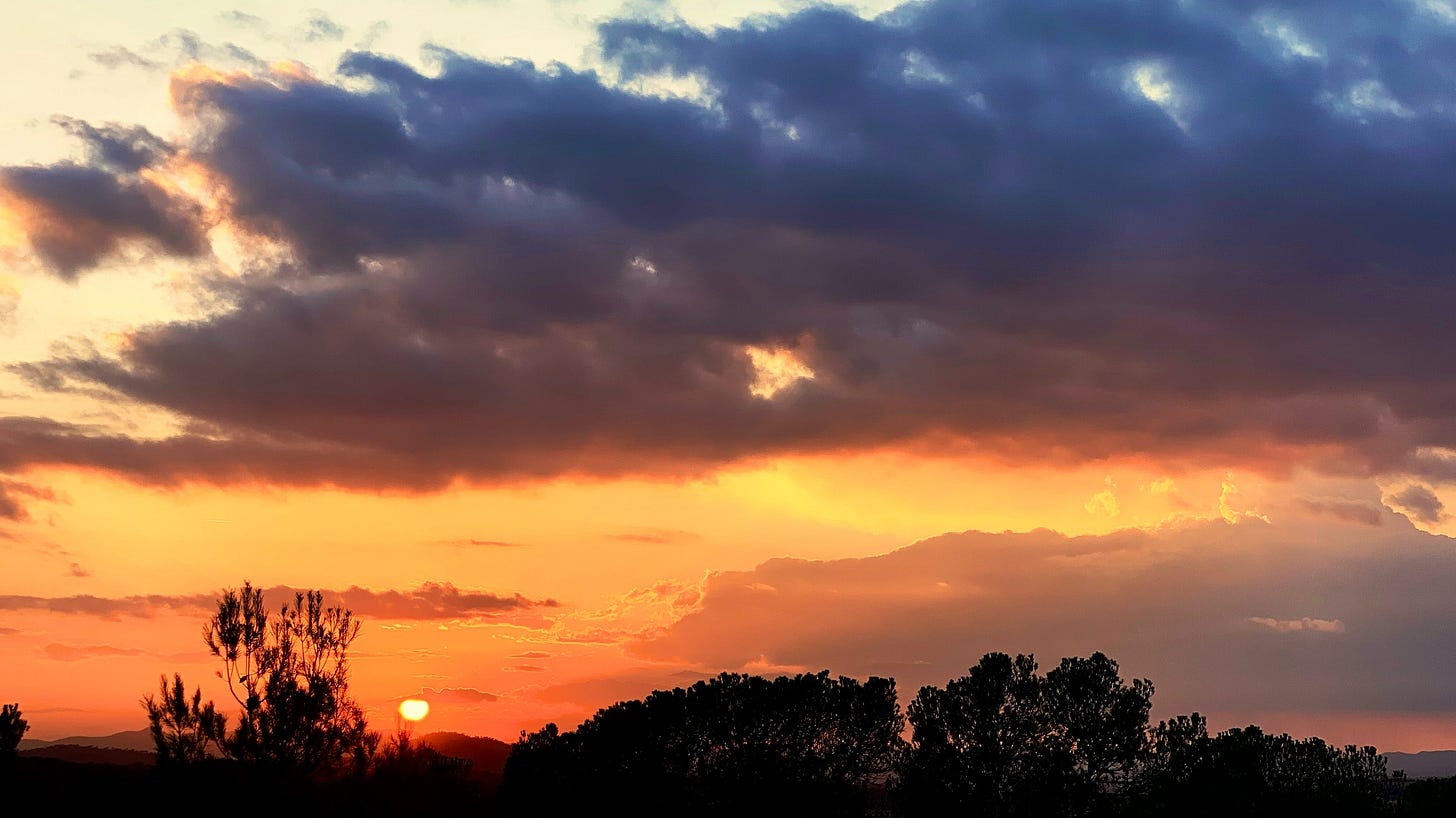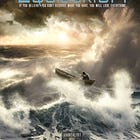A note: This piece of fiction is part of a larger project, a weird fiction novel.
Here is its opening: Dedication and Premise.
Or go to the Table of Contents.
WHAT did he believe, hmm? What, after all the disappointments? Now that disillusionment had taken away any horizon, leaving him alone, at the center of himself, at the mercy of a dead calm? What, that he no longer even drifted?
Motionless, he was holding his breath, as if a single exhalation could break the balance, pushing the world a bit, but enough for it to tilt, exceed its center of gravity and collapse.
Impossible. The world revolved around the sun. It spun and spun and did not fall, nor it needed his inner paralysis to keep floating. For that matter, he didn’t need it either. Quite the opposite: he should set out again.
He perceived his reluctance, though. Something held him back.
The air reddened and he glanced up to admire the sunset; la puesta del sol, as they called it there in Spain. After three lustres, he still didn’t consider those lands “home,” condemned to always sense himself as passing through, a feeling familiar to anyone who had lived abroad for a long time. With so many influences, the boundaries of your being became misty.
Seeking solitude to reflect, he reached that hilltop in Collserola Park, far away from distractions and impurities. The woods oxygenated his brain. For nine consecutive days he had come there, and yet he would arrive, sit on the trunk lying by the side of the drove road and not know what to think.
He drank from the canteen to stall for time. Nothing. His mind was filled with irrelevant things, devoid of even the slightest lasting influence on his existence.
Puzzled, he had wondered if that feeling of incompleteness made sense. It seemed it didn’t. Nothing in his life prompted him to do anything different, other than what he was already doing, that is. After two major emotional earthquakes, no other jolts were in sight, except for minor aftershocks.
Of the two, the closest in time was his separation from his wife a year earlier. Even his daughter, by far the most painful and sensitive part of the matter, had now taken the blow, although she was still a child. True, she wasn’t serene, and as a result, neither was he. The worst was over, though. He felt he should, could and would look forward.
He had even got rid of the office. Any office: he worked from home, writing articles for a variety of clients. Some paid him very well, others underpaid him, but they all allowed him to make a little extra at the end of the month. Moreover, he didn’t sign his work, a crucial aspect because he treasured his peace of mind. A former computer scientist, he specialized in technology. The field was vast and varied enough to keep boredom at bay. In short, everything was fine.
As for his personal aspirations, his old and greatest dream of becoming a novelist had turned into a nightmare about ten years earlier. The other earthquake. Little by little, but relentless depression had taken hold of him. Thankfully, he had recovered and had been writing again for some time, driven by the sheer love for writing.
Fanciful ambitions? None. Expectations? Zero.
Are you really sure, Isra? Yes.
He often pondered this question to avoid being surprised anew. Never again he would fall into the Hole—as he called the chronic depressive state when apathy dominates your existence and you struggle just to live.
In his interpretation, that non-place wasn’t the syndrome itself, but one of its phases. Years earlier, a psychoanalyst had told him that the depressed never quite freed themselves from the dark illness. Based on his own experience, he believed such a theory to be true. Today, he no longer considered depression an enemy, but a traveling companion. Still present, in fact. It placed a cold bony hand on his shoulder from behind and whispered in his ear: “You’re going in the wrong direction…” An expert on directions, you couldn’t blame it for its chilling natural touch sending shivers down your spine.
Are you sure, Isra?
Yes. Which brought him back to square one: what did he believe? First—he told himself—that wasn’t the right question to ask, nor did he perceive it as the most urgent. Indeed, another one mattered more: what was his next horizon? His traveling companion had taught him that the direction mattered. Even more so now that he was living as if he had crystallized, something he was quite certain: he could feel it.
A horizon. Yes.
“Which way do we go, Oto?” Sitting between his feet, his dog—an Andalusian mongrel that had once been very black but was now as gray as he—raised his head and wagged the tail. “Shall I decide?” He stroked it, gave it two affectionate pats and went back to staring at the sunset. “Okay… ¡Vámonos!”
He got up and walked down the slope.
The twilight would be short. Though the days seemed spring-like, except for the skeletal deciduous trees, January’s chill crept in and the temperature was dropping fast, so he walked at a decent pace. In half an hour, he would leave the Collserola woods behind him, after which there would only be a few cultivated fields between him and the car.
He took a side path he loved, where the scent of the forest was intoxicating because of the high humidity. Shady, it ran parallel to the main trail, hidden by two walls of vegetation. Oto was scampering not far away, sniffing the ground with his head bowed.
He was going home. At the thought of having personal time until the following morning, he was overwhelmed by the new bittersweet emotion he had not yet come to terms; one of the unexpected “gifts” of separation.
Enjoying his creativity without distractions was sweet. Unfortunately, more than just bittersweet, it also meant that he wouldn’t be able to see his daughter, hold her close, and then tuck her under the covers like he did when she was with him, there, in the modest apartment where he had moved. In the dark, sitting on the edge of the bed, he forced himself to remind her she should be asleep, when he would’ve liked to stay awake all night with her, marveling at her inner world and laughing. It was the time of the day when his daughter asked him unexpected questions, often profound ones, and did everything to avoid falling into Orpheus’ arms. That quite curious creature, never tamed, had become his definition of “magic”.
Half of his life was solitude and contemplation, the other half was magic and sharing. Half of it tasted superfluous, the other half was everything.
Which direction do you want to go? he asked himself, knowing he could convert his shuffling gait into a more sustained pace. Worthy. The way he lived half of his life was indeed superfluous. So it presented him an opportunity: he had time, and he could use it much better than he had so far.
He didn’t blame himself. A separation, when a nine-year-old daughter was part of the parting family, wouldn’t have been easy for anyone. A year to regain his balance and ask himself what he wanted to do with his life seemed a reasonable amount of time.
In which direction, then? He stopped in the middle of the path, mindful of an article written for his own amusement during the pandemic. The one about the crossroads. What was the title? He took out his smartphone, opened Scrivener, and began flipping through the hundreds of writings, until he found it.
««« PREVIOUS PIECE (DEDICATION and PREMISE)
NEXT PIECE (CHAPTER TWO) »»»
Author’s Note: This is my translation from Italian. Translating is an exciting experience, but also quite frustrating. I’m no longer used to not having complete control over the language I use to tell my stories.
No matter how hard I try, and despite many revisions, I will never be as good as an expert English writer, or a professional translator, which I can’t afford, unfortunately.
If you notice any grammatical or syntactic errors—horrors!—please point them out to me in the comments. I will be forever grateful.
Gloss: Quirky is fine with me, as long as it's an acceptable solution in English. You have no idea how weird this story is going to get.








I really like the "traveling companion" idea. There wasn't anything in the translation that felt wrong or out of place for me.